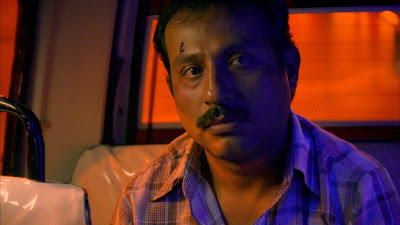 And so the film Chicha tu madre ends up resembling an Argentine film shot in Peru, with all the translations and distortions that such appropriation necessitates. But in the end it doesn't quite work, and looks too much like a knock-off Argentine movie than a truly hybrid Peruvian reinvention. Perhaps this shouldn't matter, and we should dispense altogether with the national frames that in any case hardly function any more when it comes to Latin American cinema as a whole. But I would have liked to have seen even more of the "desborde popular" or popular excess (recently again subject to critical debate and elite condescension in the Peruvian press) that is, ironically, a prime characteristic of Peru and of Lima's chicha culture above all.
And so the film Chicha tu madre ends up resembling an Argentine film shot in Peru, with all the translations and distortions that such appropriation necessitates. But in the end it doesn't quite work, and looks too much like a knock-off Argentine movie than a truly hybrid Peruvian reinvention. Perhaps this shouldn't matter, and we should dispense altogether with the national frames that in any case hardly function any more when it comes to Latin American cinema as a whole. But I would have liked to have seen even more of the "desborde popular" or popular excess (recently again subject to critical debate and elite condescension in the Peruvian press) that is, ironically, a prime characteristic of Peru and of Lima's chicha culture above all.The movie's plot follows the rather aimless wanderings of lower-middle class Julio César. He himself is loath to see his life as aimless, guided as it is by regular reading of the Tarot, that he is learning from a somewhat shady maestro. Other things that give his life purpose include his attempts to come to grips with the fact that his daughter is pregnant, and so that he is imminently about to become a grandfather, his regular trips to brothels and strip clubs, his involvement with a local football team bidding to rise from the second to the first division, and perhaps above all the constant attempt to get hold of money by fair means or foul. So the twists and turns of everyday life, instantiated also in his work as a taxi driver, albeit one who first sells his car to a friend before then stealing it back, all involve constant wheeling and dealing, negotiation and quick thinking.

Unfortunately, unlike the typical pibe (such as, say, the conmen of Nueve reinas or the lead character in El abrazo partido) who would play such a role in Argentine popular culture, JC (as he calls himself) is not always smart enough, or perhaps more positively is too sentimental and fixed in his ways, to achieve this ducking and diving with complete success. He remains too much in awe of various mentor figures: not least the Tarot maestro, but also his new friend, an Argentine male nurse who's running some kind of racket bussing sickly Peruvians and Bolivians to be treated in the "Eva Perón Hospital" back in Buenos Aires. Meanwhile, one scene in which JC drops his hooker girlfriend at her front door and then waves to her with a glove puppet rabbit while hiding under the dash is a good example of his clownish but also endearing immaturity.
Talking of hooker girlfriends, this film was sold in Peru very much on the basis of the buxom delights of actress Tula Rodríguez and model Karen Dejo, who makes a brief appearance as a stripper who goes by the sobriquet of "the electric woman." Peru's chicha culture is rather more interested in sex than is its Argentine equivalent. But a sign that the film didn't quite live up to its promise is the fact that so many viewers felt cheated when they realized that it was much less explicit than its publicity had intimated.

In fact, the focus is much more on machinations around the football club, whose Argentine trainer indulges in some typically porteño trickery in order to ensure a win in the final game of the season. And it's hardly a surprise that the movie's final scene shows JC, his girlfriend, her infirm grandmother, and a busload of other Peruvians, all headed towards Buenos Aires, where we're told that the second part of this planned filmic trilogy will be set and shot.
In sum, still more chichería is required for Chicha tu madre to show Lima's true chaotic multitudinousness.
YouTube Link: the film's trailer.
Bonus Link: Chicha tu madre official site
No comments:
Post a Comment